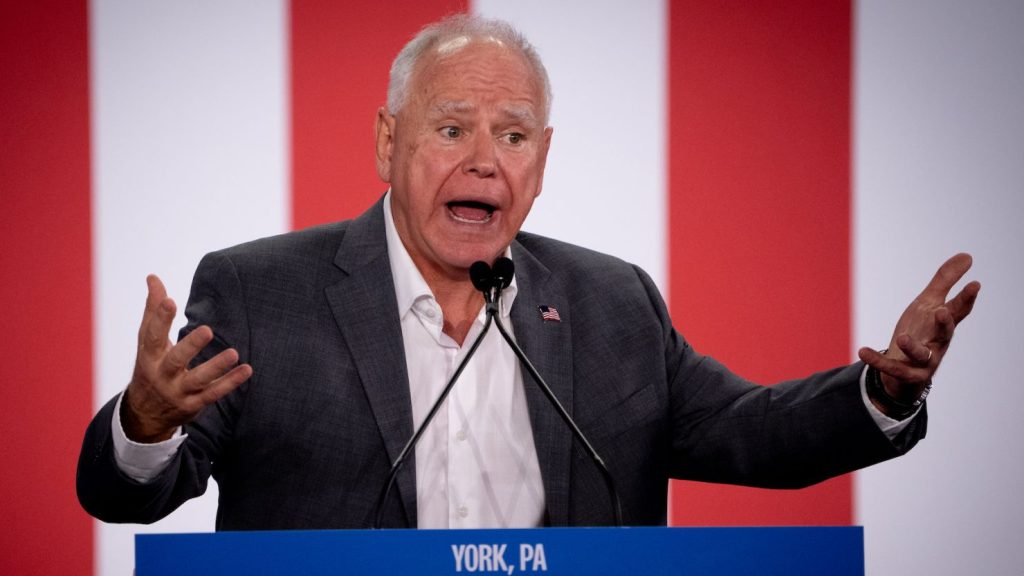Minnesota Governor Tim Walz made headlines during a recent campaign fundraiser in California by stating that the Electoral College “needs to go.” While acknowledging the challenges of enacting such a change, he emphasized the importance of winning key battleground states in the upcoming election.
Speaking to supporters at Governor Gavin Newsom’s private residence in Sacramento, Walz articulated his views on the Electoral College and the necessity of a national popular vote. “I think all of us know the Electoral College needs to go. We need a national popular vote, but that’s not the world we live in,” he explained. He highlighted the significance of securing victories in critical areas like Beaver County, Pennsylvania, and western Wisconsin, asserting, “We need to be in Reno, Nevada, and win.”
Although Walz’s comments reflect his personal beliefs, they do not represent an official stance of the Harris campaign, as clarified by a campaign official. “Governor Walz believes that every vote matters in the Electoral College, and he is honored to be traveling the country and battleground states to earn support for the Harris-Walz ticket,” the spokesperson noted. They added that his comments were meant to acknowledge the campaign’s strategy to secure 270 electoral votes, while expressing gratitude to supporters for their contributions.
Walz’s call for eliminating the Electoral College aligns with sentiments previously expressed by Vice President Kamala Harris. During her presidential campaign in 2019, she stated that she was “open to the discussion” about abolishing the Electoral College, highlighting the diminishing influence of the popular vote in determining the presidency. “There’s no question that the popular vote has been diminished in terms of making the final decision about who’s the president of the United States, and we need to deal with that,” Harris said at the time.
The timing of Walz’s remarks coincided with a busy day of fundraising activities. Earlier, he participated in another fundraiser in the Seattle suburbs and later held a campaign rally in Reno, Nevada. His focused efforts reflect the critical nature of these battleground states, which will play a crucial role in the upcoming election.
The discussion around the Electoral College has gained traction in recent years, particularly following the 2016 presidential election when former President Donald Trump won the presidency despite losing the popular vote to Hillary Clinton. This situation was not isolated; in five U.S. presidential elections, including 2016, the winner has lost the popular vote while securing victory through the Electoral College.
The movement to abolish the Electoral College gained additional momentum after the 2020 elections, during a national reckoning with issues of race and democracy. Some historians argue that the origins of the Electoral College are tied to systemic racial injustices, complicating its role in contemporary politics. However, amending or eliminating the Electoral College is a complex process due to constitutional barriers.
Support for reforming or abolishing the Electoral College often stems from concerns about its impact on voter representation and the overall democratic process. Critics argue that the system disproportionately favors certain states and diminishes the power of individual votes, particularly in states that are not considered battlegrounds. Advocates for change argue that a national popular vote would ensure that every vote carries equal weight in determining the outcome of presidential elections.
As Walz and Harris campaign across the country, their stance on this issue may resonate with voters frustrated by the current electoral system. The idea of a national popular vote aligns with a broader push for electoral reform, reflecting changing attitudes toward governance and representation in the United States.
In a political landscape increasingly defined by division and partisanship, the debate over the Electoral College remains a crucial topic for many voters. Walz’s comments serve as a reminder of the ongoing discussions surrounding the efficacy and fairness of the electoral process, as candidates work to connect with constituents and advocate for a more equitable system.
As the election approaches, Walz and Harris will likely continue to engage with these pressing issues, seeking to galvanize support and address the concerns of voters who desire change in how their voices are heard in the democratic process.







